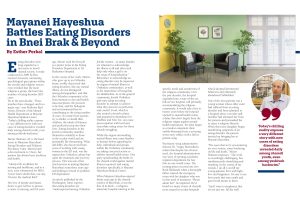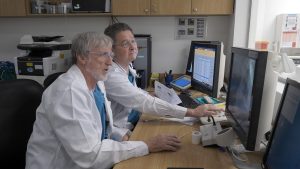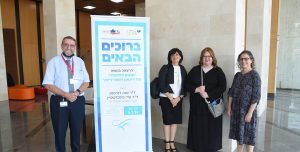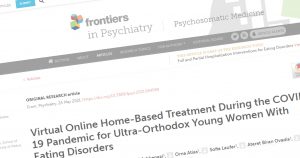He treated victims of the Second Lebanon War to the point of exhaustion, was summoned to try and save the prime minister’s life after a public shooting, dealt terror attack casualties during the Second Intifada, and was charged with treating the President of Moetzet Gedolei HaTorah. Professor Eliyahu Sorkin determines life-and-death decisions daily, yet in his private life writes to the Lubavicher Rebbe for advice. “I believe that he is still alive.”
For the last few days of his life, Menachem Begin was hospitalized in Ichilov Hospital’s Intensive Care Unit. The hospital management decided not to issue any public updates on the former Prime Minister’s medical condition, and certainly not to allow any reporters in. “We didn’t speak to anyone,” reminisces Professor Eliyahu Sorkin, who was head of the unit for over twenty years, “and still, every day the newspapers flashed updates: ‘Doctors Say Begin’s Condition Deteriorating!’ ‘Nurses Talk of Improvement!’ Chadashot was the only newspaper that reported that no information was being made available.”
And we see what happened to them…
“That was when I understood that there is little connection between ‘information’ reported [in the media] and reality,” Sorkin continues. “There are many young reporters who try to create sensational headlines, to move from page 13 to the first page, and they’re willing to do a lot for that, even to be unreliable.”
Two years ago, Sorkin retired from his position in Ichilov and began to manage the Intensive Care Unit at Mayanei Hayeshua Medical Center. He mentions Begin’s hospitalization to explain why it was so difficult to convince him to agree to the interview. In his work, Sorkin had a firsthand view of many newsflash events. He treated dozens of soldiers wounded in Operation Peace for Galilee, was recruited to Unit 669 and participated in daring rescue missions. He personally treated victims of the devastating terror attacks in Dizengoff Center and the Dolphinarium, as well as former Prime Minister Yitzhak Rabin, who was rushed to Ichilov after being shot at what is now known as Rabin Square.
As manager of the Intensive Care Unit at Mayanei Hayeshua, Sorkin also closely followed Rabbi Aharon Steinman’s treatments during the last few months of his life – a role that had the Haredi media closely following every word uttered by the Chabad-affiliated doctor. During that time, he received an unusual offer: members of the Vizhnitz-Monsey hassidut in New York asked to consult with him regarding the medical treatments offered to their leader, the Vizhnitz-Monsey Rebbe, who was hospitalized in critical condition in a hospital in Manhattan. Professor Sorkin faced a dilemma: Should he travel abroad to treat the sick Rebbe in New York, or remain in Israel with Rabbi Steinman? He resolved the problem using the standard Chabad means: by writing a letter to the Lubavicher Rebbe and burying it inside one of the Rebbe’s Igrot Kodesh volumes, then opening a different volume to a random page to find the answer. The response he saw left no doubts: “It is not practical to inquire after the words of rabbis abroad; only rabbis living in the Holy Land” were the words that he found on the page that he opened. In keeping with this answer, Prof. Sorkin remained at Rabbi Steinman’s side until his passing.
“When you treat these great people, they have no connection to anything you know about regular people,” he says. “Their responses are sharp and more connected to the control that this holy man has over his body.”
Does the knowledge that an entire population is personally connected to this patient affect a doctor’s work?
“As a physician, you are meant to ignore the background noise; otherwise you will not be able to work. There are some people who do not want to come close to a holy man at all. He wakes up and you approach him and apologize for inserting a tube into his lung or vein or trachea. You apologize for what you did – not for the result, because you are being a good messenger, but because the process is unpleasant.”
How does one say goodbye to such a patient?
“You don’t. And anyway, what is life and what is death? There are people who may be a hundred years old but really died long ago, because they don’t do anything with their lives. And then in contrast, there’s a person who keeps learning and deepening his knowledge of Judaism and contributes to society – his life continues after he dies, too.
“Rabbi Steinman asked that everything about his funeral be kept low-key, and that people should not eulogize him. A person who does not want to be eulogized is not dead. His influence continues here in the street below. That’s life, and that’s something he has never left.”
“Not For You”
We meet in the morning at Maaynei Hayeshuah Medical Center in Bnei Brak, which services patients who are mainly members of the Haredi community. Every so often, doctors and nurses pop in to Prof. Sorkin’s room to consult with the world-renowned intensive care specialist. When I mention that the atmosphere seems quite calm and ask if he misses the drama of the Tel Aviv hospital, Sorkin shakes his head. “Unfortunately, my time at Ichilov was at the height of the intifada. Although there is no difference between the patients here and the wounded there then as far as the kind of treatment…we aim to give each and every one of them, and it makes no difference what the [patient’s] age or diagnosis is, on an emotional level, seeing young people who were just hurt in a bombing attack is not simple at all. You can’t process it. It leaves an imprint for the rest of your life.”
Sorkin, a member of a family that survived the Holocaust, was born in Paris nearly seventy years ago. His parents immigrated to France from Egypt and Ukraine about twenty years before World War II broke out, and met each other as neighbors in a shared building. During the war, they managed to hide in their apartment building, and they got married soon afterwards.
The home in which young Eliyahu – then Patrick – Sorkin grew up lacked any indication of Jewish identity. On X-mas they would even place an x-mas tree in their living room. His grandfather, he says, “hated Russians, Germans, Poles, and religious Jews.” His only memory of his early childhood years related in any way to Judaism was his grandmother’s custom of preparing a festive meal on Rosh Hashanah. “In my extended family there are cousins who were never circumcised. I am a walking miracle in that I remained Jewish. My mother was proud of her Judaism, but it didn’t mean much to her, either. She is more French than the French themselves.”
He found out that he was different than his friends in the showers they shared at the summer camp he attended as a young boy. “It was a very traumatic experience for me,” he says. When his best friend, a devout Christian, was sent to the priest for New Testament lessons before his Rite of Passage ceremony, Sorkin wanted to do the same. His mother told him that that would be impossible. “You’re different from your friend. That has nothing to do with you.” His friend’s parents also told him that he has nothing to look for in Christianity lessons, but he still could not understand. “When I started asking questions, my grandfather took me to the Grand Synagogue in Paris. I didn’t know Hebrew. I sat there for hours and did not understand a thing. It was not simple.”
His bar mitzvah celebration was held at a Reform temple. His birthday is on the week of the Lech Lecha Torah reading portion, but the weather in the European city was too frigid that year, and, fearing that guests might not show up, the ceremony was pushed off to the summer. “I remained with the memory of the haftarah that I read and the gifts [I received]; nothing more,” he recounts.
At age seventeen he suddenly felt an intense urge to visit Israel, and perhaps even enlist in its army. He approached the Jewish Agency but they waved him away again and again. When the Six-Day War broke out, he decided that it was time for him to go to Israel. “I and two other friends called El Al and asked when the next flight to Israel was going to be. There was silence on the other end of the line, and then they told us that there was a flight the next day. We were almost the only ones on it.”
Landing in Israel, Sorkin felt that he had reached home. “I got off in Lod, smelled the eucalyptuses in the airport, and felt as if I had already been here before. I suddenly knew that this was where I wanted to live. It was [a feeling] inside me, not an actual thought.”
He and his friends lived in Kibbutz Mishmar Ha’emek by relatives of one of them. The three young men volunteered at the farm and did various odd jobs. Later on they also volunteered at the Armored Corps camp. “Our job was to paint the insides of the tanks, while it was 86 degrees outside. We managed to survive there for a few weeks.”
What was your impression of Israel in those days?
“It was Gan Eden here. Everything was open. There were no fenced yards. Now every person has a Rottweiler guarding his property. Then it was a completely different place as far as love of other Jews.”
In September 1967, Sorkin returned to France and began his studies at the University of Paris. “Why medicine?” I ask him, and he shrugs and points heavenward. “Apparently that is what [God] has led me to do. And anyway, I’m Jewish. What could make a Jewish mother happier than having a son who is a doctor? Maybe only if he is a lawyer, too.”
And why did you choose to specialize in intensive care?
“A person suffering from flu is less interesting. He can drink tea and it will go away.”
The desire to settle in Israel permanently persisted. “I went to the Jewish Agency and they told me, ‘What are you studying? Come back here when you are a doctor.’ Once I became a doctor I returned to the Agency and was told, ‘Come back after you complete your residency.’ That’s what it sounded like for fourteen years.”
In the meantime, Sorkin married Jaclyn, who comes from a traditional Jewish home originally from North Africa. Their first joint trip outside of France was to Israel. Sorkin took advantage of the opportunity to search for a job and found one in Hadassah Har Hazofim. But before they could fulfill their dream of making Aliyah, the couple first needed to sell their home in Paris so that they would have enough money to begin a new life in Israel. They published an ad in the newspapers and waited for people to call, but two months passed with nobody calling. Having no other choice, they were forced to delay their Aliyah plans again.
Instead of the job promised to him in Hadassah Har Hazofim, Sorkin began working as a medical manager in a French pharmaceutical company specializing in baby formulas. Three years passed, and in 1980 he was asked to organize a professional conference on enteral feeding in the ICU. “The French, as usual, wanted doctors from Tunisia, Algeria, and Morocco. I insisted on a doctor from Israel. I said that if they did not allow me to invite a doctor from Israel, I would leave.” In the end, the directors of the conference acquiesced and Sorkin brought Professor Shimon Borstein, manager of the Intensive Care Unit at Rambam Hospital in Haifa. When the two met at the conference, Borstein wondered aloud why Sorkin was not making Aliyah, and invited him to work in Rambam. “Once again, we put an ad for our apartment and again two months passed and nobody called. We were close to giving up. We really, really wanted to make Aliyah but we already had two children and needed a minimal initial capital.”
And then Sorkin had a dream. An old man with a white beard appeared to him and told him that all he needed to do in order to sell his house was to build a dividing wall between the dining area and the living room. In the morning, Sorkin shared the dream with Jaclyn, but she was skeptical and said that renovating the house now would cost money that they did not have. In the end, they found someone to do the job for a low price. As the worker was already standing in middle of the living room and the house was dirty and strewn with construction supplies, they finally received a phonecall from someone who was interested in buying the apartment. Sorkin tried to postpone the potential buyer’s visit and told him that they were in middle of doing renovations, but the man came to see the house and immediately decided to buy it. “We came to Israel before we even had a chance to complete that wall. It was simply incredible. That is called hishtadlut – doing your part. A Jew must do his part, and then God helps him.”
Falling Asleep In Blood
In November 1981, the family arrived in Israel. Sorkin joined an ulpan to learn Hebrew, but quickly gave up. “It took me a full week to learn just the letter Aleph. I couldn’t continue like that.” He began to work in Rambam. Since Borstein as well as his deputy spoke French, too, the three doctors’ visits were conducted in French.
When the First Lebanon War broke out, Sorkin found himself the only doctor in the ICU after all the others were quickly recruited to the battlefield. “I was alone, day and night. Those were hellish weeks, unlike anything else I can recall. Young boys were constantly streaming in, everything around was full of blood. I had only just arrived from France a few weeks before, from a place where everything is good and beautiful, and suddenly – an inferno. I didn’t go home. I only called once a day. We had three children by then, and my wife was alone with them in our apartment.”
Over thirty years had passed since then, but there is one scene that has never left him. It was when a soldier was rushed in after being killed by friendly fire, and Sorkin was the one who was forced to share the sad news with the family. “They screamed and banged their heads on the wall. As a doctor, you don’t know what to do in that kind of situation. The more you talk, the more they scream. Some time later another member of that same family was killed, and then I really had no words.”
One night, reaching a point of overwhelming exhaustion, Sorkin fell asleep on one of the stretchers that only moments before had been used to carry a victim. When he woke up, he found his face completely covered in blood. “I was so exhausted that I simply didn’t care to lie there with all that blood.” It was only a month and a half after the battle broke out that additional reinforcements were sent to the unit and Sorkin was finally able to return to his home. “When I got home, my wife said, ‘I’m so glad you’re back. I want to go out and do some shopping.’ I said, ‘Go, I’ll watch the kids.’ Two minutes later I fell asleep and my little son walked out into the street with nothing on other than his diaper. That’s how my wife found him.”
After a year and a half in Rambam, he was offered a position in Ichilov Hospital and the family moved to Raanana. At around that same time, Sorkin decided to utilize his experience as a doctor specializing in trauma to benefit the IDF. He applied for IDF’s Unit 669, the Air Force’s rescue unit, and was accepted. The thirty-some-year-old doctor underwent basic training alongside 18-year-old youngsters, and after a shortened service officially joined the Unit. In subsequent years he was called for a large number of heroic rescue missions, some even inside Lebanese territory. “In one such case, a paratroopers’ force was eliminated by a minefield planted by Hezbollah. None of the soldiers survived. You get on a Yas’ur helicopter, fly there, hastily load all their body parts, and quickly fly back to Israel. In the hospital there were young soldiers awaiting us, and they broke down emotionally when they saw it. And then you need to give them encouragement.”
As part of his service in Unit 669 he also participated in Operation Solomon, helping Ethiopian Jews immigrate to Israel. “It was very moving. In one of the flights I assisted in three births. The mothers were very quiet. They didn’t even scream, and suddenly the baby was out.”
Five years after he began working in Ichilov, he was appointed manager of the ICU – the youngest doctor in Israel to receive such a responsibility. During his tenure there he was witness to quite a number of dramatic events, including the attempts to save Yitzhak Rabin’s life. “On that infamous Saturday night I was in Haifa, so I quickly drove over to the hospital,” he recalls. “I got there after Rabin was admitted to the emergency room. The doctors in the operating room asked me to see if I could help. Like I said, a doctor does not differentiate between his patients, but I could not avoid thinking about the fact that there was a prime minister lying here before me, having been shot by a fellow Jew. That cemented my realization that the single most important thing that must be promoted in our country is unity. It is crucial for our success as part of the very essence of the Jewish nation. That night, I understood that we have learned nothing from our history, from the destruction of the Second Temple to the Holocaust.
“A few of my family members were in the Concentration Camps, and that prompted me to research the history of the Jewish nation during that period. I found that as the Holocaust was raging, there were internal battles going on in the Warsaw Ghetto between Haredim, Zionists and Communists. The Germans were killing them, and they were fighting! Why?! I feel that in 1967 we were still different, and ever since then it has been deteriorating.”
The twenty-first century arrived and with it, the fatal terror attacks that once again put him face to face with difficult scenes. He clearly remembers how he was summoned to the hospital on a Friday, only moments after a suicide bomber blew himself up at the entrance to the Dolphinarium. “Wounded girls, ages 14-15, are brought in, and you can’t identify anything. A family comes and shows you a photo of a young, healthy, beautiful, smiling young woman, and there is no resemblance between that and what you see before you now.”
How do you deal with it?
“The families of the victims have a support system – a social worker, a psychologist – that they can turn to, to let out their feelings. As a doctor, you are alone. Go deal with it on your own. When you are facing such difficult scenes day in, day out, you need to keep going, to move everything over into the subconscious so that it will not affect you. Because at the end of the day, you are on a mission, and it makes no difference what the conditions around you are like – you need to give your all as a doctor, and mostly, as a Jew. You tell yourself that is has to do with you only on a professional level, and disconnect from it on the emotional level.
“During that period I kept finding myself crying in my room. After one of the terrorist attacks I went up to the roof of the hospital one night, lifted my arms to God and asked, ‘What do You want from us?’ I was that shaken by the scenes [I saw].”
How does it affect your belief [in God]?
“It doesn’t. You understand that God is your Father, and you cry, ‘Father, enough! We got the message! Help us!’ We have been getting it for thousands of years already. Rabi Akiva also went to the remnants of the Temple, saw a fox walking around there, and smiled. A person who has shut out God does not ask ‘Where is God?’ – not mine, and not his. And a person who truly believes does not ask [questions]. The [Lubavicher] Rebbe says that we cannot ask questions about the Holocaust, because we cannot understand it. I read that we do not ask where God was during the Holocaust – but rather, where was man?”
The conversation is interrupted by sounds of voices singing Happy Birthday. The nurses outside are celebrating a fellow staff member’s birthday. “You see? This is not a depressing unit,” Sorkin smiles. “There’s life, and there’s smiling.”
“You Don’t Retire from a Mission”
When he turned 67 and it was time to retire, Sorkin thought that now he would finally be able to sit and learn. “Ever since I was 18 I was…in the ICU, and I was looking forward to a ‘cease-fire.’ But there really is no [such thing as] a doctor who truly retires. I once met a retired doctor who told me, ‘It’s a different life. You take trips, go out to restaurants, spend time with your family,’ and suddenly his phone rang. He answered and [I heard him] say, ‘No, no, Mrs. Levy, you must continue the treatment!’ A doctor remains a doctor. It’s not a profession; it’s a mission. Even if it is a doctor performing a nose job –it’s a mission.”
Here, too, like a good Lubavicher hassid, he turned to the Rebbe via the Igrot Kodesh method to determine his next move. “I got a dress-down,” he says. “The answer was that continuing to work would be good for me both physically and spiritually.”
Sorkin was introduced to Hassidut already in the 80’s, after his move to Raanana. Sorkin, who at that point in his life wore a knitted kippah, was invited by a neighbor to join a new Chabad minyan (prayer quorum of ten men). “I told him, ‘Thanks, I’m fine,’ but we did begin to study the Tanya together.’” With time, he began joining the Chabad minyan as well. Today, he wears a kippah bearing the telling slogan, ‘Yechi adonenu moreinu verabenu,’ testifying to his belonging to the ‘Meshichist’ stream in Chabad – those who believe that the Lubavicher Rebbe had never died.
As a rational person and a doctor who daily comes face to face with death, do you truly believe that the Rebbe is still alive?
“I believe that the Rebbe is alive, obviously. That’s on the one hand. It is also obvious that we don’t see him, but his influence exists and is infinite. There are many Jews who dream about him and see him. Today, even non-Jews are beginning to understand that we can only see about twenty percent of the world, and we need to investigate the eighty percent that we do not see.”
On the bookshelves in his office is a set of Igrot Kodesh volumes, which he received from the family of one of his patients. “A young man suffering from liver failure was admitted to our unit at Ichilov. His family was a [wealthy Tel Aviv], four-by-four [trip-going] type of family, and I am not saying that in a derogatory way, Heaven forbid. We implanted an artificial liver, but his condition was still not improving. His sister came to me and asked, ‘Why isn’t he waking up?’ I told her that a Jew is comprised of both body and soul. We, the doctors, treat the body, and they can treat the spiritual side. She saw the photo of the Rebbe in my office and asked me where he is. When I told her, ‘In New York,’ she said that she wants to fly there to speak to him. I explained to her that the Rebbe is not physically there, and in order to speak to him we write a letter [and put it] into an Igrot Kodesh volume. The next day, they came here with the entire set, and then they left it here for me for the other patients’ use. By the way – or maybe not ‘by the way’ at all – that boy did indeed end up recuperating.”
How do you face a patient’s family when you don’t have good news to share?
“Some people think that doctors are prophets who can determine whether a patient will live another week or a month. A doctor is not a prophet, and anyone who says ‘You have no more than two months [to live]’ is not a doctor. A doctor needs to do the maximum on that day, while he is treating his patient. I can say that the [patient’s condition] is serious, but when people ask me ‘when’ or ‘how long’ – I don’t know.”
A recent news segment reported that of all Intensive Care Units in the country, the one in Maaynei Hayeshuah was ranked most contaminated by the Ministry of Health. Sorkin is not impressed by the incriminating data. “The actual evaluation conducted by the Ministry of Health is a good thing, but they do not take into account many things that should be taken into account to determine whether the unit is contaminated or not. For example – the main reasons for most patients’ stay there. There are many reasons why a patient would be referred to the ICU – car accidents, terror attacks, or post-operative patients who need careful supervision. In those cases there usually isn’t any contamination. In our unit, on the other hand, ninety percent are there due to infectious diseases [to begin with]. These are the patients who come here, and we see their cultures during admission already. That is why calling this unit ‘the most contaminated unit’ is simply deceptive. It doesn’t make sense to compare us to other units.”
Sorkin and his wife have five sons, and not one of them followed their father’s professional path: Four of them chose the legal field while a fifth is in high-tech. “I have no doubt that had we remained in France, five of the five would have been doctors,” says Sorkin. “First of all, in France the studies are free. Second, the admission requirements are much more reasonable: Any person who has matriculation certification can study medicine. If during the first two years he fails to meet the requirements, he is thrown out, but at least he has a chance to begin. Here, you need to receive a hundred or more on the bagrut test, and then a 770 score in the [psycho-didactic evaluation]. Does that make for a better doctor? Not at all. Any person who has the time, energy, and money, can improve his grades and get accepted to the study programs. Others, no less talented, do not even begin this route. And that’s a pity.”








